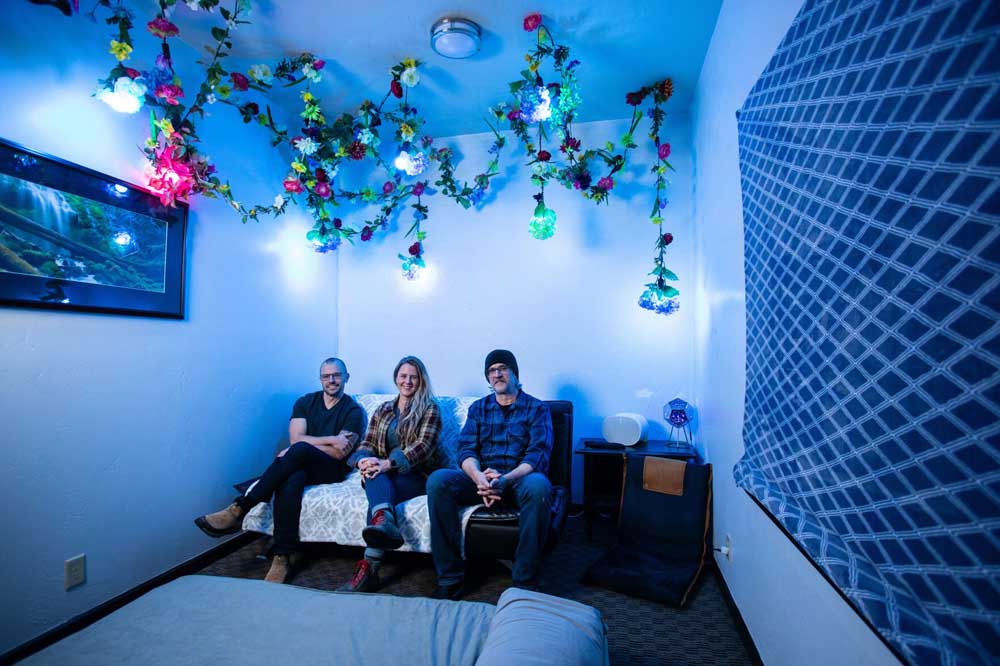Drop Thesis to provide psilocybin therapy as new industry expands
Published 9:00 am Wednesday, January 24, 2024

- From left, Drop Thesis partners Ryan Reid, Serena Dietrich, and Gary Bracelin sit inside one of the rooms where they plan to administer psilocybin therapy to clients on Thursday in Bend.
BEND — Drop Thesis will become Bend’s third licensed psilocybin center and will focus on wellness and consciousness expansion.
Each patient’s session will take 12 to 15 hours with a licensed facilitator in a structured environment designed to create a safe psychedelic experience, said Drop Thesis co-founder Ryan Reid. The facility, at 505 NW Franklin Ave., is one of three in Bend, and will open sometime in February, but there is already a wait list.
There are 21 licensed psilocybin service centers statewide approved by the Oregon Health Authority. Eventually, the company will add a manufacturing location to become vertically integrated.
Oregon legalized psilocybin for therapeutic use in 2020. According to the Healing Advocacy Fund, about 715 people have received psilocybin therapy access in Oregon since the services were officially allowed in 2023. Psilocybin is approved in Oregon and Colorado to treat depression, anxiety or addiction.
‘Psilocybin benefits people’
The Oregon Health Authority oversees the psilocybin program, which started licensing facilitator training programs in late 2022. The health authority began accepting applications for licenses for workers, facilitators, manufacturers, laboratories and service centers.
“Psilocybin therapy benefits people,” said Amanda Gow, executive director and cofounder of Bendable Therapy, which is an education, resource and referral nonprofit. “A third of the patients we helped are veterans. Psilocybin research is new and there is evidence it has the capacity to increase neural pathways.”
A psilocybin session costs about $3,000, a price that could be out of reach for some. Gow’s nonprofit, Bendable Therapy, has given $40,000 in funding to people seeking the experience. Insurance doesn’t cover the experience, so to make it accessible to everyone, the nonprofit helps by providing funding for users who can’t afford the service.
“The center is where you come in and have an experience,” Reid said. “It’s a complicated experience. Psilocybin can be therapeutic.”
Reid, Drop Thesis co-founder, said he wants to create an environment focused on creating an experience of wellness and restoration of mind and body using psilocybin in a structured setting. The business is co-founded by Reid, Gary Bracelin and Serena Dietrich.
During a therapy session, licensed professionals will screen and guide participants through the experience and stay with them in one of four session rooms. The center will also have one room for a group session, Reid said. Participants are required to fill out consent forms.
From cannabis to psilocybin
Bracelin, who also co-founded Tokyo Starfish, a vertically integrated Bend cannabis company, got involved with Reid and the idea of opening a psilocybin center about three years ago.
“My specific background and interest is in emerging markets where I began with action sports and the snowboarding industry,” said Bracelin, who also leads the Bend Outdoor Worx, an outdoor products incubator in town.
“I love to build a brand,” he said. “Through my decade of involvement in the cannabis business, I’ve also become comfortable with emerging and ever-changing regulations and actually enjoy the challenge of unique and innovative markets.”
Reid said he’s experienced psilocybin himself. He said that the experience is hard to define in words. The center will provide a calm setting that could include eye shades to help the user explore the subconscious. It takes about three hours and another couple of hours before starting to feel normal again. Each participant will stay in a room and not be allowed to drive home.
“Everyone has a different intention,” Reid said. “It will require a lot of processing and understanding of the unconscious. The professionals will talk through that. The big question is what is the intention of the user? What does the individual want from the session? We want to make sure they’re prepared for it.
“It’s fantastic that we can experience this legally and with a structured, intentional environment.”




